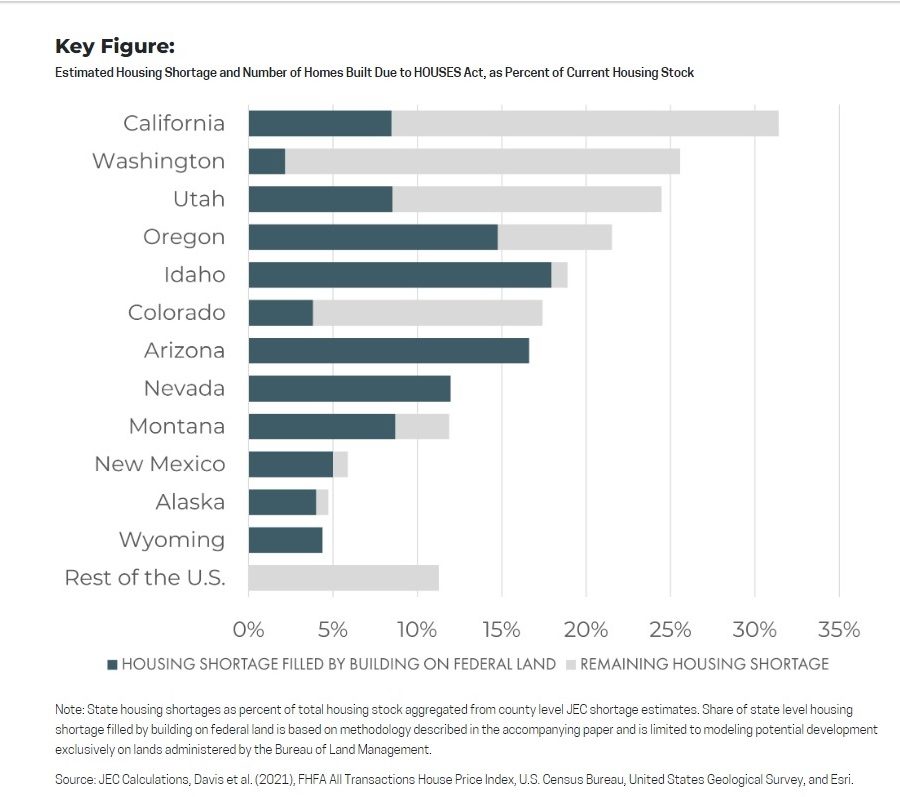
Senate Bill Could Erase Nevada Housing Shortage
Legislation introduced in the U.S. Senate could eliminate Nevada’s affordable housing crisis.
Sen. Mike Lee, R-Utah, earlier this year introduced the Helping Open Underutilized Space to Ensure Shelter Act, also called the HOUSES Act, to enable state and local governments to address housing affordability by repurposing public land.
This bill is of particular interest to Nevada, where the federal government owns more than 80 percent of the state.
Such a large amount of development-restricted land means fewer homes and apartments can be built, which means higher prices for existing housing, as Nevada Policy explains in its recent study The Construction of a Crisis.
The bill, which would exclude national parks, wilderness areas and similarly protected lands from sale, would authorize the sale of certain federal land to states and units of local government for projects to provide housing.
The proposal could greatly increase housing throughout the Western U.S. without any federal spending or interference with local decision-making, and with very little loss in federal land holdings.
Nevada has the dubious honor of having the highest percentage of federally owned land in the United States. As a result, fully four of every five acres of the Silver State cannot be built on by private individuals.
 Nevada has 12 percent fewer homes than it needs to accommodate its population. Passage of the HOUSES Act would allow construction of more than 159,000 residences in Nevada, doing away with the shortage, according to analysis released this month by the U.S. Joint Economic Committee Republicans.
Nevada has 12 percent fewer homes than it needs to accommodate its population. Passage of the HOUSES Act would allow construction of more than 159,000 residences in Nevada, doing away with the shortage, according to analysis released this month by the U.S. Joint Economic Committee Republicans.
Nevada’s population has grown sharply over the past few decades, but construction has not kept pace, causing a spike in housing prices, in particular in Clark and Washoe counties. For many Nevadans, this has made either purchasing or renting a home difficult or even impossible.
Single-family home prices in Nevada’s two most populous cities broke records earlier this year: In May Las Vegas saw a median price of $482,000, an increase of 25 percent over 2021; while the Reno-Sparks area hit $615,000, up 23 percent from last year, according to information from the Las Vegas Realtors Association and the Reno/Sparks Association of Realtors.
In addition to Nevada, Lee’s proposal would fill housing shortages in Arizona and Wyoming, and most of that which exists in Idaho (95 percent of the shortage), Alaska (85 percent) and New Mexico (85 percent). It would also alleviate a substantial portion of housing shortages in California, Colorado, Montana, Oregon, Utah and Washington.
The bill is co-sponsored by Sen. Mitt Romney, R-Utah, Sen. John Barrasso, R-Wyo., Sen. Cynthia Lummis, R-Wyo., and Sen. Dan Sullivan, R-Alaska.
“We must make finding and affording houses more accessible for everyone,” Romney said in a statement, adding that increasing the amount of federal land that can be used for housing development will start to address the housing shortage in the Western U.S.
The bill requires that at least 85 percent of acquired land be used for residential housing and related community needs. Community needs would include schools, churches, grocery stores, hospitals and health clinics. No more than 15 percent of property could be used for commercial purposes.
The Bureau of Land Management, which oversees much of Nevada’s federal land, opposes the bill because it would require the agency to “sell land without sufficient evaluation of the values to the public or to future generations, or sufficient compensation to the American taxpayer,” according to testimony before the Senate Energy and Natural Resources Subcommittee on Public Lands, Forests & Mining this past June.